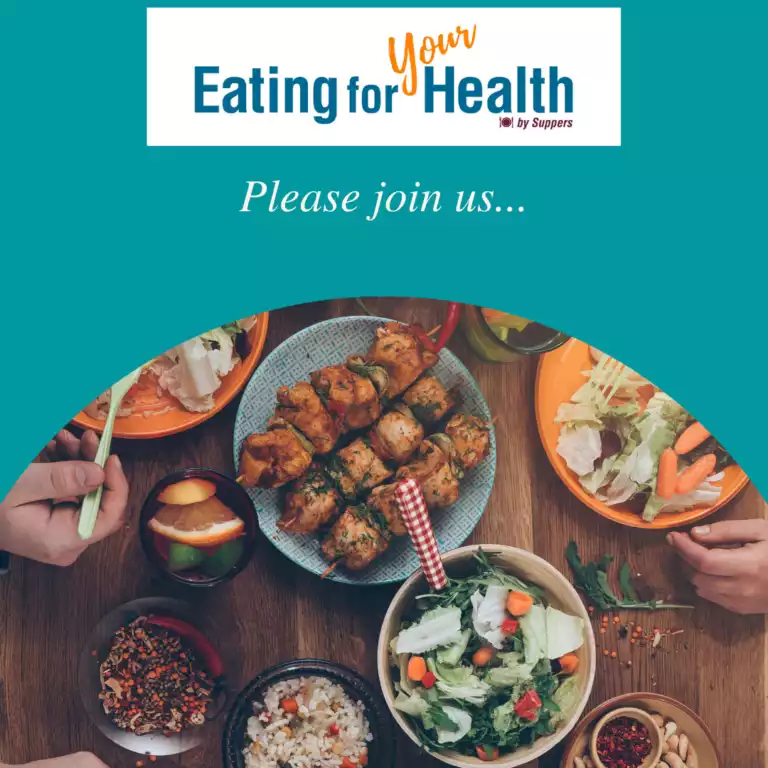
To extend our community outreach, the library partners with the many municipal, non-profit, and business organizations that make Princeton such an extraordinary town. This month, we spoke with Marion Renson, executive director of Eating For Your Health (formerly The Suppers Program).
The library has worked with this group for several years to help our community members improve their health by learning more about food and themselves. The programs have always been popular – particularly since they were opportunities for people to share the delicious food that they learned about and prepared. One memorable program was a dinner and screening of the film, “Soul Food Junkies” (available on Kanopy) by Byron Hurt. In collaboration with the Momo Group and The Suppers Program, a feast was served before the screening which was followed by a Q&A with Hurt, Dorothy Mullen, founder of The Suppers Program, and Raoul Momo, co-owner of the Terra Momo Restaurant Group.
Some recipes from Eating For Your Health can be found on the community recipe sharing page of EngagePrinceton.org.
How long has Eating For Your Health been in Princeton?
Eating For Your Health (formerly and fondly known as The Suppers Programs) has been in Princeton since 2008.
What is your primary area of focus?
Eating For Your Health helps people change the way they eat and transform their relationship with food to improve their health. We embrace the concept that every person and every body is unique and therefore, no single approach to food is right for everyone. So, instead of prescribing a way of eating, we encourage participants to explore and experiment with food that reflects their taste, budget, background and culture. We do not prescribe any specific style of eating as “healthiest” except to avoid processed foods, whenever possible, with an emphasis on the importance of eating single, whole fresh ingredients.
How does your mission align with the library’s?
Our mission is three-fold:
- Increase awareness of the importance and the benefits associated with cooking and eating whole foods for health
- Provide meaningful support to encourage behavior change in order to prevent and reduce the impact of chronic disease
- Design and deliver educational programs informed by robust science and research
Having said this, we are in alignment with the library’s mission to “engage, inspire, educate and unite everyone,” but for us it is around the topic of eating for your health. We do not tell people what specific foods or style of eating works best – we provide information and leave it to the individual to decide what works best for them.
With whom do you work most in the community?
We work with other non-profits, faith-based organizations, school systems and higher education, civic organizations and businesses. Our goal is to reach as many eaters as possible in the community. We enjoy partnering with other organizations – we all eat!
What is something that you do that people might not know about?
Of our seven pillars, these three make us unique.
How You Feel is Data®
Our bodies have a lot to tell us if we take the time to listen. Learn to observe the connections between what you eat and how you feel so that you can find your best health. We share the importance of slowing down to notice subtle cues that the food you are eating may or may not be supporting your needs and health.
Nutritional Harm Reduction®
Learn how to take small steps at your own pace moving toward eating in a way that supports your wellbeing. Nutritional harm reduction describes the process of increasing the foods that support your health and reducing the foods that don’t. (We recognize that finding a healthier way of eating is a gradual transition process and that it takes time to determine which foods work best for you.
Non-Judgment
Most people learn best when they feel comfortable and where setbacks as well as successes are considered part of the process. We are all human after all, complete with minor setbacks, and that is why we think a non-judgement zone is so important.
Is there any project or event that you are particularly excited about at the moment?
Each month we present “What’s In Your Grocery Cart?” free of charge.
Other upcoming programs include:
Nourish to Flourish: How to Live Successfully with Diabetes – a 5-Part Series
Feb. 1, 8, 15, 22 and 25 – 7-8:30 p.m.
In this interactive series, you’ll learn how nourishing yourself through informed decisions about food, activity, medication, and attitude – and discovering and using your strengths – can improve your daily diabetes management.
This program is designed for individuals who are prediabetic, have Type 1 or Type 2 diabetes or LADA, and their loved ones and caregivers.
